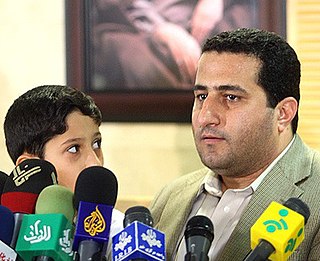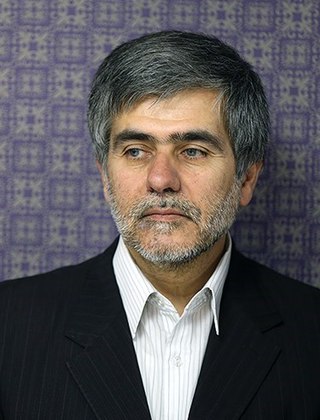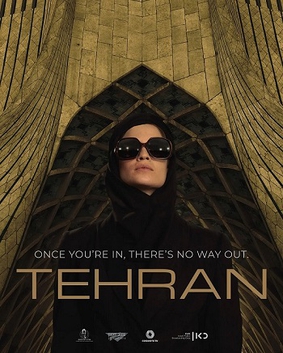
Evin Prison is a prison located in the Evin neighborhood of Tehran, Iran. The prison has been the primary site for the housing of Iran's political prisoners since 1972, before and after the Iranian Revolution, in a purpose-built wing nicknamed "Evin University" due to the high number of students and intellectuals detained there. Evin Prison has been accused of committing "serious human rights abuses" against its political dissidents and critics of the government.

Alborz High School is a college-preparatory gifted high school located in the heart of Tehran, Iran. It is one of the first modern high schools in Asia and the Middle East, named after the Alborz mountain range, north of Tehran. Its place in the shaping of Iran's intellectual elite compares with that of Eton College in England and institutions such as Phillips Academy, Phillips Exeter Academy, and Milton Academy in the United States.

The relations between Iran and Israel are divided into four major phases: the ambivalent period from 1947 to 1953, the friendly period during the era of the Pahlavi dynasty from 1953 to 1979, the worsening period following the Iranian Revolution from 1979 to 1990, and the ongoing period of open hostility since the end of the Gulf War in 1991. In 1947, Iran was among 13 countries that voted against the United Nations Partition Plan for the British Mandate of Palestine. Two years later, Iran also voted against Israel's admission to the United Nations.
Ardeshir Hosseinpour was an Iranian nuclear scientist, physics professor, and electromagnetism expert, who was involved in the Iranian nuclear program. He died mysteriously in early 2007 during his nuclear work at Isfahan.

Mohsen Fakhrizadeh Mahabadi was an Iranian nuclear physicist and scientist. He was regarded as the chief of Iran's nuclear program.

Shahram Amiri was an Iranian nuclear scientist who disappeared from Iran during 2009–2010 under disputed circumstances, and was executed by the Iranian government in August 2016.

The Institute for Intelligence and Special Operations, popularly known as Mossad, is the national intelligence agency of the State of Israel. It is one of the main entities in the Israeli Intelligence Community, along with Aman and Shin Bet.
Events in the year 2010 in the Islamic Republic of Iran.
Majid Shahriari was a top Iranian nuclear scientist and physicist who worked with the Atomic Energy Organization of Iran.

Fereydoon Abbasi-Davani is an Iranian nuclear scientist who was head of the Atomic Energy Organization from 2011 to 2013. He survived an assassination attempt in 2010, but was wounded. He is a conservative and principlist politician.

Mostafa Ahmadi Roshan was an Iranian nuclear scientist who was assassinated in 2012. He was also deputy of commerce at the Natanz nuclear power plant.
Events in the year 2012 in the Islamic Republic of Iran.

The Iran–Israel proxy conflict, also known as the Iran–Israel proxy war or Iran–Israel Cold War, is an ongoing proxy conflict between Iran and Israel. In the Israeli–Lebanese conflict, Iran has supported Lebanese Shia militias, most notably Hezbollah. In the Israeli-Palestinian conflict, Iran has backed Palestinian groups such as Hamas. Israel has supported Iranian rebels, such as the People's Mujahedin of Iran, conducted airstrikes against Iranian allies in Syria and assassinated Iranian nuclear scientists. In 2018 Israeli forces directly attacked Iranian forces in Syria.
The State of Israel has been accused of engaging in state-sponsored terrorism, as well as committing acts of state terrorism on a daily basis in the Palestinian territories. Countries that have condemned Israel's role as a perpetrator of state-sponsored terrorism or state terrorism include Bolivia, Iran, Lebanon, Oman, Saudi Arabia, Syria, Turkey, and Yemen.
Between 2010 and 2020, five Iranian nuclear scientists were killed in foreign-linked assassinations. Rezaeinejad was shot dead by gunmen on motorcycles, while Shahriari and Ahmadi Roshan were killed by explosives attached to their cars. Fereydoon Abbasi was also targeted in a car bombing, but survived.

Tehran is an Israeli spy thriller television series created by Moshe Zonder for the Israeli public channel Kan 11. Written by Zonder and Omri Shenhar and directed by Daniel Syrkin, the series premiered in Israel on 22 June 2020 and 25 September internationally on Apple TV+.
Hassan Sayyad Khodaei was an Iranian military officer who served in the Islamic Revolutionary Guard Corps (IRGC). Serving as a Holy Shrine Defender, he was assassinated on 22 May 2022 by motorcycle-riding gunmen in front of his home. Iran has blamed the assassination on "global arrogance," a term used to refer to the United States and its allies, such as Israel. According to the Wall Street Journal, the New York Times and other sources citing people familiar with the matter, Khodaei planned kidnappings and killings for an arm of the IRGC known as Quds Force Unit 840, including failed plots to kill an Israeli diplomat, an American general and a French intellectual.
On 31 January 2018, fewer than two dozen Israeli Mossad agents infiltrated a secret warehouse in southern Tehran, Iran, and pilfered 100,000 documents, including paper records and computer files, documenting the nuclear weapons work of Iran's AMAD Project between 1999 and 2003. The trove was part of Iran's clandestine nuclear archive, and documented years of work on atomic weapons, warhead designs and production plans.









